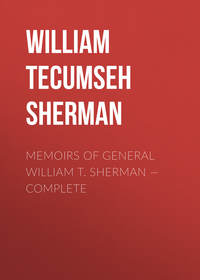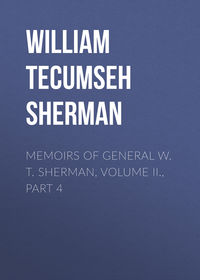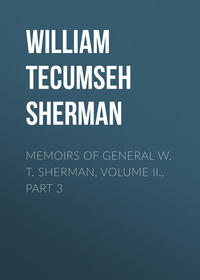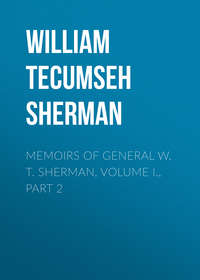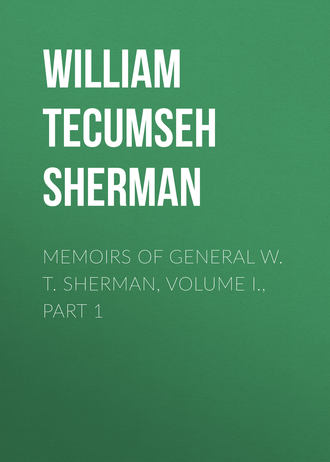 полная версия
полная версияMemoirs of General W. T. Sherman, Volume I., Part 1
Here we found Mr. Henry A. Wise, of Virginia, the United States minister to Brazil, and a Dr. Garnett, United States Navy, his intended son-in-law. We had a very interesting conversation, in which Mr. Wise enlarged on the fact that Rio was supplied from the "dews of heaven," for in the dry season the water comes from the mists and fogs which hang around the Corcovado, drips from the leaves of the trees, and is conducted to the Madre fountain by miles of tile gutters. Halleck and I continued our ascent of the mountain, catching from points of the way magnificent views of the scenery round about Rio Janeiro. We reached near the summit what was called the emperor's coffee-plantation, where we saw coffee-berries in their various stages, and the scaffolds on which the berries were dried before being cleaned. The coffee-tree reminded me of the red haw-tree of Ohio, and the berries were somewhat like those of the same tree, two grains of coffee being inclosed in one berry. These were dried and cleaned of the husk by hand or by machinery. A short, steep ascent from this place carried us to the summit, from which is beheld one of the most picturesque views on earth. The Organ Mountains to the west and north, the ocean to the east, the city of Rio with its red-tiled houses at our feet, and the entire harbor like a map spread out, with innumerable bright valleys, make up a landscape that cannot be described by mere words. This spot is universally visited by strangers, and has often been described. After enjoying it immeasurably, we returned to the city by another route, tired but amply repaid by our long walk.
In due time all had been done that was requisite, and the Lexington put to sea and resumed her voyage. In October we approached Cape Horn, the first land descried was Staten Island, white with snow, and the ship seemed to be aiming for the channel to its west, straits of Le Maire, but her course was changed and we passed around to the east. In time we saw Cape Horn; an island rounded like an oven, after which it takes its name (Ornos) oven. Here we experienced very rough weather, buffeting about under storm stay-sails, and spending nearly a month before the wind favored our passage and enabled the course of the ship to be changed for Valparaiso. One day we sailed parallel with a French sloop-of-war, and it was sublime to watch the two ships rising and falling in those long deep swells of the ocean. All the time we were followed by the usual large flocks of Cape-pigeons and albatrosses of every color. The former resembled the common barn-pigeon exactly, but are in fact gulls of beautiful and varied colors, mostly dove-color. We caught many with fishing-lines baited with pork. We also took in the same way many albatrosses. The white ones are very large, and their down is equal to that of the swan. At last Cape Horn and its swelling seas were left behind, and we reached Valparaiso in about sixty days from Rio. We anchored in the open roadstead, and spent there about ten days, visiting all the usual places of interest, its foretop, main-top, mizzen-top, etc. Halleck and Ord went up to Santiago, the capital of Chili, some sixty miles inland, but I did not go. Valparaiso did not impress me favorably at all. Seen from the sea, it looked like a long string of houses along the narrow beach, surmounted with red banks of earth, with little verdure, and no trees at all. Northward the space widened out somewhat, and gave room for a plaza, but the mass of houses in that quarter were poor. We were there in November, corresponding to our early spring, and we enjoyed the large strawberries which abounded. The Independence frigate, Commodore Shubrick, came in while we were there, having overtaken us, bound also for California. We met there also the sloop-of-war levant, from California, and from the officers heard of many of the events that had transpired about the time the navy, under Commodore Sloat, had taken possession of the country.
All the necessary supplies being renewed in Valparaiso, the voyage was resumed. For nearly forty days we had uninterrupted favorable winds, being in the "trades," and, having settled down to sailor habits, time passed without notice. We had brought with us all the books we could find in New York about California, and had read them over and over again: Wilkes's "Exploring Expedition;" Dana's "Two Years before the Mast;" and Forbes's "Account of the Missions." It was generally understood we were bound for Monterey, then the capital of Upper California. We knew, of course, that General Kearney was enroute for the same country overland; that Fremont was therewith his exploring party; that the navy had already taken possession, and that a regiment of volunteers, Stevenson's, was to follow us from New York; but nevertheless we were impatient to reach our destination. About the middle of January the ship began to approach the California coast, of which the captain was duly cautious, because the English and Spanish charts differed some fifteen miles in the longitude, and on all the charts a current of two miles an hour was indicated northward along the coast. At last land was made one morning, and here occurred one of those accidents so provoking after a long and tedious voyage. Macomb, the master and regular navigator, had made the correct observations, but Nicholson during the night, by an observation on the north star, put the ship some twenty miles farther south than was the case by the regular reckoning, so that Captain Bailey gave directions to alter the course of the ship more to the north, and to follow the coast up, and to keep a good lookout for Point Pinos that marks the location of Monterey Bay. The usual north wind slackened, so that when noon allowed Macomb to get a good observation, it was found that we were north of Ano Nuevo, the northern headland of Monterey Bay. The ship was put about, but little by little arose one of those southeast storms so common on the coast in winter, and we buffeted about for several days, cursing that unfortunate observation on the north star, for, on first sighting the coast, had we turned for Monterey, instead of away to the north, we would have been snugly anchored before the storm. But the southeaster abated, and the usual northwest wind came out again, and we sailed steadily down into the roadstead of Monterey Bay. This is shaped somewhat like a fish hook, the barb being the harbor, the point being Point Pinos, the southern headland. Slowly the land came out of the water, the high mountains about Santa Cruz, the low beach of the Saunas, and the strongly-marked ridge terminating in the sea in a point of dark pine-trees. Then the line of whitewashed houses of adobe, backed by the groves of dark oaks, resembling old apple-trees; and then we saw two vessels anchored close to the town. One was a small merchant-brig and another a large ship apparently dismasted. At last we saw a boat coming out to meet us, and when it came alongside, we were surprised to find Lieutenant Henry Wise, master of the Independence frigate, that we had left at Valparaiso. Wise had come off to pilot us to our anchorage. While giving orders to the man at the wheel, he, in his peculiar fluent style, told to us, gathered about him, that the Independence had sailed from Valparaiso a week after us and had been in Monterey a week; that the Californians had broken out into an insurrection; that the naval fleet under Commodore Stockton was all down the coast about San Diego; that General Kearney had reached the country, but had had a severe battle at San Pascual, and had been worsted, losing several officers and men, himself and others wounded; that war was then going on at Los Angeles; that the whole country was full of guerrillas, and that recently at Yerba Buena the alcalde, Lieutenant Bartlett, United States Navy, while out after cattle, had been lassoed, etc., etc. Indeed, in the short space of time that Wise was piloting our ship in, he told us more news than we could have learned on shore in a week, and, being unfamiliar with the great distances, we imagined that we should have to debark and begin fighting at once. Swords were brought out, guns oiled and made ready, and every thing was in a bustle when the old Lexington dropped her anchor on January 26, 1847, in Monterey Bay, after a voyage of one hundred and ninety-eight days from New York. Every thing on shore looked bright and beautiful, the hills covered with grass and flowers, the live-oaks so serene and homelike, and the low adobe houses, with red-tiled roofs and whitened walls, contrasted well with the dark pine-trees behind, making a decidedly good impression upon us who had come so far to spy out the land. Nothing could be more peaceful in its looks than Monterey in January, 1847. We had already made the acquaintance of Commodore Shubrick and the officers of the Independence in Valparaiso, so that we again met as old friends. Immediate preparations were made for landing, and, as I was quartermaster and commissary, I had plenty to do. There was a small wharf and an adobe custom-house in possession of the navy; also a barrack of two stories, occupied by some marines, commanded by Lieutenant Maddox; and on a hill to the west of the town had been built a two-story block-house of hewed logs occupied by a guard of sailors under command of Lieutenant Baldwin, United States Navy. Not a single modern wagon or cart was to be had in Monterey, nothing but the old Mexican cart with wooden wheels, drawn by two or three pairs of oxen, yoked by the horns. A man named Tom Cole had two or more of these, and he came into immediate requisition. The United States consul, and most prominent man there at the time, was Thomas O. Larkin, who had a store and a pretty good two-story house occupied by his family. It was soon determined that our company was to land and encamp on the hill at the block-house, and we were also to have possession of the warehouse, or custom-house, for storage. The company was landed on the wharf, and we all marched in full dress with knapsacks and arms, to the hill and relieved the guard under Lieutenant Baldwin. Tents and camp-equipage were hauled up, and soon the camp was established. I remained in a room at the customhouse, where I could superintend the landing of the stores and their proper distribution. I had brought out from New York twenty thousand dollars commissary funds, and eight thousand dollars quartermaster funds, and as the ship contained about six months' supply of provisions, also a saw-mill, grist-mill, and almost every thing needed, we were soon established comfortably. We found the people of Monterey a mixed set of Americans, native Mexicans, and Indians, about one thousand all told. They were kind and pleasant, and seemed to have nothing to do, except such as owned ranches in the country for the rearing of horses and cattle. Horses could be bought at any price from four dollars up to sixteen, but no horse was ever valued above a doubloon or Mexican ounce (sixteen dollars). Cattle cost eight dollars fifty cents for the best, and this made beef net about two cents a pound, but at that time nobody bought beef by the pound, but by the carcass.
Game of all kinds—elk, deer, wild geese, and ducks—was abundant; but coffee, sugar, and small stores, were rare and costly.
There were some half-dozen shops or stores, but their shelves were empty. The people were very fond of riding, dancing, and of shows of any kind. The young fellows took great delight in showing off their horsemanship, and would dash along, picking up a half-dollar from the ground, stop their horses in full career and turn about on the space of a bullock's hide, and their skill with the lasso was certainly wonderful. At full speed they could cast their lasso about the horns of a bull, or so throw it as to catch any particular foot. These fellows would work all day on horseback in driving cattle or catching wildhorses for a mere nothing, but all the money offered would not have hired one of them to walk a mile. The girls were very fond of dancing, and they did dance gracefully and well. Every Sunday, regularly, we had a baile, or dance, and sometimes interspersed through the week.
I remember very well, soon after our arrival, that we were all invited to witness a play called "Adam and Eve." Eve was personated by a pretty young girl known as Dolores Gomez, who, however, was dressed very unlike Eve, for she was covered with a petticoat and spangles. Adam was personated by her brother—the same who has since become somewhat famous as the person on whom is founded the McGarrahan claim. God Almighty was personated, and heaven's occupants seemed very human. Yet the play was pretty, interesting, and elicited universal applause. All the month of February we were by day preparing for our long stay in the country, and at night making the most of the balls and parties of the most primitive kind, picking up a smattering of Spanish, and extending our acquaintance with the people and the costumbrea del pais. I can well recall that Ord and I, impatient to look inland, got permission and started for the Mission of San Juan Bautista. Mounted on horses, and with our carbines, we took the road by El Toro, quite a prominent hill, around which passes the road to the south, following the Saunas or Monterey River. After about twenty miles over a sandy country covered with oak-bushes and scrub, we entered quite a pretty valley in which there was a ranch at the foot of the Toro. Resting there a while and getting some information, we again started in the direction of a mountain to the north of the Saunas, called the Gavillano. It was quite dark when we reached the Saunas River, which we attempted to pass at several points, but found it full of water, and the quicksands were bad. Hearing the bark of a dog, we changed our course in that direction, and, on hailing, were answered by voices which directed us where to cross. Our knowledge of the language was limited, but we managed to understand, and to founder through the sand and water, and reached a small adobe-house on the banks of the Salinas, where we spent the night: The house was a single room, without floor or glass; only a rude door, and window with bars. Not a particle of food but meat, yet the man and woman entertained us with the language of lords put themselves, their house, and every thing, at our "disposition," and made little barefoot children dance for our entertainment. We made our supper of beef, and slept on a bullock's hide on the dirt-floor. In the morning we crossed the Salinas Plain, about fifteen miles of level ground, taking a shot occasionally at wild-geese, which abounded there, and entering the well-wooded valley that comes out from the foot of the Gavillano. We had cruised about all day, and it was almost dark when we reached the house of a Senor Gomez, father of those who at Monterey had performed the parts of Adam and Eve. His house was a two-story adobe, and had a fence in front. It was situated well up among the foot-hills of the Gavillano, and could not be seen until within a few yards. We hitched our horses to the fence and went in just as Gomez was about to sit down to a tempting supper of stewed hare and tortillas. We were officers and caballeros and could not be ignored. After turning our horses to grass, at his invitation we joined him at supper. The allowance, though ample for one, was rather short for three, and I thought the Spanish grandiloquent politeness of Gomez, who was fat and old, was not over-cordial. However, down we sat, and I was helped to a dish of rabbit, with what I thought to be an abundant sauce of tomato. Taking a good mouthful, I felt as though I had taken liquid fire; the tomato was chile colorado, or red pepper, of the purest kind. It nearly killed me, and I saw Gomez's eyes twinkle, for he saw that his share of supper was increased.—I contented myself with bits of the meat, and an abundant supply of tortillas. Ord was better case-hardened, and stood it better. We staid at Gomez's that night, sleeping, as all did, on the ground, and the next morning we crossed the hill by the bridle-path to the old Mission of San Juan Bautista. The Mission was in a beautiful valley, very level, and bounded on all sides by hills. The plain was covered with wild-grasses and mustard, and had abundant water. Cattle and horses were seen in all directions, and it was manifest that the priests who first occupied the country were good judges of land. It was Sunday, and all the people, about, a hundred, had come to church from the country round about. Ord was somewhat of a Catholic, and entered the church with his clanking spars and kneeled down, attracting the attention of all, for he had on the uniform of an American officer. As soon as church was out, all rushed to the various sports. I saw the priest, with his gray robes tucked up, playing at billiards, others were cock fighting, and some at horse-racing. My horse had become lame, and I resolved to buy another. As soon as it was known that I wanted a horse, several came for me, and displayed their horses by dashing past and hauling them up short. There was a fine black stallion that attracted my notice, and, after trying him myself, I concluded a purchase. I left with the seller my own lame horse, which he was to bring to me at Monterey, when I was to pay him ten dollars for the other. The Mission of San Juan bore the marks of high prosperity at a former period, and had a good pear-orchard just under the plateau where stood the church. After spending the day, Ord and I returned to Monterey, about thirty-five miles, by a shorter route, Thus passed the month of February, and, though there were no mails or regular expresses, we heard occasionally from Yerba Buena and Sutter's Fort to the north, and from the army and navy about Los Angeles at the south. We also knew that a quarrel had grown up at Los Angeles, between General Kearney, Colonel Fremont, and Commodore Stockton, as to the right to control affairs in California. Kearney had with him only the fragments of the two companies of dragoons, which had come across from New Mexico with him, and had been handled very roughly by Don Andreas Pico, at San Pascual, in which engagement Captains Moore and Johnson, and Lieutenant Hammond, were killed, and Kearney himself wounded. There remained with him Colonel Swords, quartermaster; Captain H. S. Turner, First Dragoons; Captains Emory and Warner, Topographical Engineers; Assistant Surgeon Griffin, and Lieutenant J. W. Davidson. Fremont had marched down from the north with a battalion of volunteers; Commodore Stockton had marched up from San Diego to Los Angeles, with General Kearney, his dragoons, and a battalion of sailors and marines, and was soon joined there by Fremont, and they jointly received the surrender of the insurgents under Andreas Pico. We also knew that General R. B. Mason had been ordered to California; that Colonel John D. Stevenson was coming out to California with a regiment of New York Volunteers; that Commodore Shubrick had orders also from the Navy Department to control matters afloat; that General Kearney, by virtue of his rank, had the right to control all the land-forces in the service of the United States; and that Fremont claimed the same right by virtue of a letter he had received from Colonel Benton, then a Senator, and a man of great influence with Polk's Administration. So that among the younger officers the query was very natural, "Who the devil is Governor of California?" One day I was on board the Independence frigate, dining with the ward-room officers, when a war-vessel was reported in the offing, which in due time was made out to be the Cyane, Captain DuPont. After dinner, we were all on deck, to watch the new arrival, the ships meanwhile exchanging signals, which were interpreted that General Kearney was on board. As the Cyane approached, a boat was sent to meet her, with Commodore Shubrick's flag-officer, Lieutenant Lewis, to carry the usual messages, and to invite General Kearney to come on board the Independence as the guest of Commodore Shubrick. Quite a number of officers were on deck, among them Lieutenants Wise, Montgomery Lewis, William Chapman, and others, noted wits and wags of the navy. In due time the Cyane anchored close by, and our boat was seen returning with a stranger in the stern-sheets, clothed in army blue. As the boat came nearer, we saw that it was General Kearney with an old dragoon coat on, and an army-cap, to which the general had added the broad vizor, cut from a full-dress hat, to shade his face and eyes against the glaring sun of the Gila region. Chapman exclaimed: "Fellows, the problem is solved; there is the grand-vizier (visor) by G-d! He is Governor of California."
All hands received the general with great heartiness, and he soon passed out of our sight into the commodore's cabin. Between Commodore Shubrick and General Kearney existed from that time forward the greatest harmony and good feeling, and no further trouble existed as to the controlling power on the Pacific coast. General Kearney had dispatched from San Diego his quartermaster, Colonel Swords, to the Sandwich Islands, to purchase clothing and stores for his men, and had come up to Monterey, bringing with him Turner and Warner, leaving Emory and the company of dragoons below. He was delighted to find a full strong company of artillery, subject to his orders, well supplied with clothing and money in all respects, and, much to the disgust of our Captain Tompkins, he took half of his company clothing and part of the money held by me for the relief of his worn-out and almost naked dragoons left behind at Los Angeles. In a few days he moved on shore, took up his quarters at Larkin's house, and established his headquarters, with Captain Turner as his adjutant general. One day Turner and Warner were at my tent, and, seeing a store-bag full of socks, drawers, and calico shirts, of which I had laid in a three years' supply, and of which they had none, made known to me their wants, and I told them to help themselves, which Turner and Warner did. The latter, however, insisted on paying me the cost, and from that date to this Turner and I have been close friends. Warner, poor fellow, was afterward killed by Indians. Things gradually came into shape, a semi-monthly courier line was established from Yerba Buena to San Diego, and we were thus enabled to keep pace with events throughout the country. In March Stevenson's regiment arrived. Colonel Mason also arrived by sea from Callao in the store-ship Erie, and P. St. George Cooke's battalion of Mormons reached San Luis Rey. A. J. Smith and George Stoneman were with him, and were assigned to the company of dragoons at Los Angeles. All these troops and the navy regarded General Kearney as the rightful commander, though Fremont still remained at Los Angeles, styling himself as Governor, issuing orders and holding his battalion of California Volunteers in apparent defiance of General Kearney. Colonel Mason and Major Turner were sent down by sea with a paymaster, with muster-rolls and orders to muster this battalion into the service of the United States, to pay and then to muster them out; but on their reaching Los Angeles Fremont would not consent to it, and the controversy became so angry that a challenge was believed to have passed between Mason and Fremont, but the duel never came about. Turner rode up by land in four or five days, and Fremont, becoming alarmed, followed him, as we supposed, to overtake him, but he did not succeed. On Fremont's arrival at Monterey, he camped in a tent about a mile out of town and called on General Kearney, and it was reported that the latter threatened him very severely and ordered him back to Los Angeles immediately, to disband his volunteers, and to cease the exercise of authority of any kind in the country. Feeling a natural curiosity to see Fremont, who was then quite famous by reason of his recent explorations and the still more recent conflicts with Kearney and Mason, I rode out to his camp, and found him in a conical tent with one Captain Owens, who was a mountaineer, trapper, etc., but originally from Zanesville, Ohio. I spent an hour or so with Fremont in his tent, took some tea with him, and left, without being much impressed with him. In due time Colonel Swords returned from the Sandwich Islands and relieved me as quartermaster. Captain William G. Marcy, son of the Secretary of War, had also come out in one of Stevenson's ships as an assistant commissary of subsistence, and was stationed at Monterey and relieved me as commissary, so that I reverted to the condition of a company-officer. While acting as a staff officer I had lived at the custom-house in Monterey, but when relieved I took a tent in line with the other company-officers on the hill, where we had a mess.


